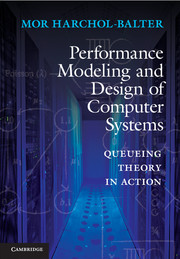Book contents
- Frontmatter
- Contents
- Preface
- Acknowledgments
- I Introduction to Queueing
- II Necessary Probability Background
- III The Predictive Power of Simple Operational Laws: “What-If” Questions and Answers
- IV From Markov Chains to Simple Queues
- V Server Farms and Networks: Multi-server, Multi-queue Systems
- VI Real-World Workloads: High Variability and Heavy Tails
- 20 Tales of Tails: A Case Study of Real-World Workloads
- 21 Phase-Type Distributions and Matrix-Analytic Methods
- 22 Networks with Time-Sharing (PS) Servers (BCMP)
- 23 The M/G/1 Queue and the Inspection Paradox
- 24 Task Assignment Policies for Server Farms
- 25 Transform Analysis
- 26 M/G/1 Transform Analysis
- 27 Power Optimization Application
- VII Smart Scheduling in the M/G/1
- Bibliography
- Index
25 - Transform Analysis
from VI - Real-World Workloads: High Variability and Heavy Tails
Published online by Cambridge University Press: 05 February 2013
- Frontmatter
- Contents
- Preface
- Acknowledgments
- I Introduction to Queueing
- II Necessary Probability Background
- III The Predictive Power of Simple Operational Laws: “What-If” Questions and Answers
- IV From Markov Chains to Simple Queues
- V Server Farms and Networks: Multi-server, Multi-queue Systems
- VI Real-World Workloads: High Variability and Heavy Tails
- 20 Tales of Tails: A Case Study of Real-World Workloads
- 21 Phase-Type Distributions and Matrix-Analytic Methods
- 22 Networks with Time-Sharing (PS) Servers (BCMP)
- 23 The M/G/1 Queue and the Inspection Paradox
- 24 Task Assignment Policies for Server Farms
- 25 Transform Analysis
- 26 M/G/1 Transform Analysis
- 27 Power Optimization Application
- VII Smart Scheduling in the M/G/1
- Bibliography
- Index
Summary
This chapter is a very brief introduction to the wonderful world of transforms. One can think of the transform of a random variable as an onion. This onion is an expression that contains inside it all the moments of the random variable. Getting the moments out of the onion is not an easy task, however, and may involve some tears as the onion is peeled, where the “peeling process” involves differentiating the transform. The first moment is stored in the outermost layer of the onion and thus does not require too much peeling to reach. The second moment is stored a little deeper, the third moment even deeper (more tears), etc. Although getting the moments is painful, it is entirely straightforward how to do it – just keep peeling the layers.
Transforms are a hugely powerful analysis technique. For example, until now we have only learned how to derive the mean response time, E[T], for the M/G/1. However, by the end of the next chapter, we will be able to derive the transform of T, which will allow us to obtain any desired moment of T.
The subject of transforms is very broad. In this chapter we only cover a small subset, namely those theorems that aremost applicable in analyzing the performance of queues. We use transforms heavily in analyzing scheduling algorithms in Part VII.
- Type
- Chapter
- Information
- Performance Modeling and Design of Computer SystemsQueueing Theory in Action, pp. 433 - 449Publisher: Cambridge University PressPrint publication year: 2013
- 1
- Cited by



